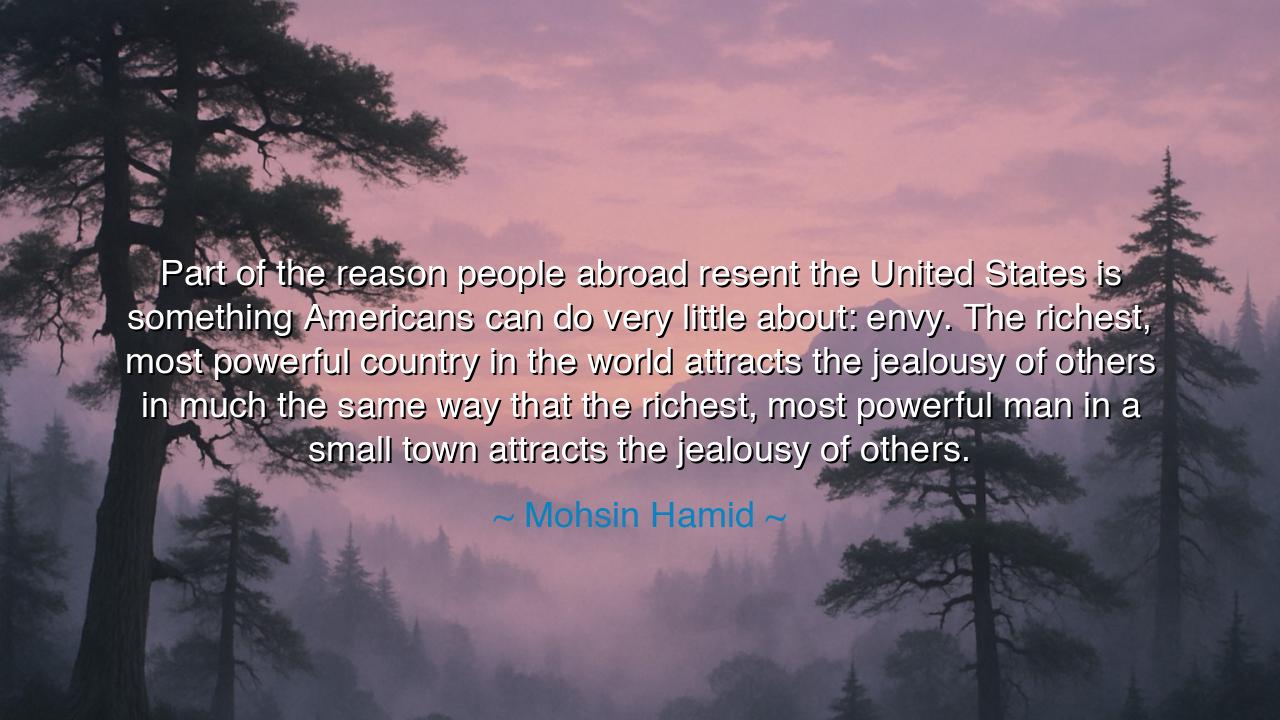
Part of the reason people abroad resent the United States is
Part of the reason people abroad resent the United States is something Americans can do very little about: envy. The richest, most powerful country in the world attracts the jealousy of others in much the same way that the richest, most powerful man in a small town attracts the jealousy of others.






"Part of the reason people abroad resent the United States is something Americans can do very little about: envy. The richest, most powerful country in the world attracts the jealousy of others in much the same way that the richest, most powerful man in a small town attracts the jealousy of others." Thus spoke Mohsin Hamid, the Pakistani novelist and keen observer of global affairs, whose words unveil a truth both ancient and eternal. Beneath the surface of politics and power, he reveals the quiet, corrosive force that has shaped human relations since the dawn of civilization—envy, that hidden serpent of the soul that coils wherever greatness stands.
Hamid’s reflection arises from the tension between nations, yet its wisdom reaches beyond the realm of geopolitics into the very heart of human nature. The United States, in his analogy, is not merely a country—it is a symbol of success, abundance, and influence. And like all who ascend to great heights, it finds itself surrounded by both admiration and resentment. This is no new phenomenon. For every empire, from Rome to Britain, has faced the same paradox: prosperity invites envy, and power, no matter how justly wielded, stirs the bitterness of those who feel overshadowed. Hamid, with the calm insight of a philosopher, reminds us that this resentment is not entirely the fruit of injustice—it is also the natural response of the human heart confronted with another’s glory.
The ancients knew this well. Envy, they taught, is among the most destructive passions of mankind. Aristotle called it “the pain at another’s good fortune,” and the poets likened it to a flame that consumes the one who bears it. It is the source of betrayal in the story of Cain and Abel, the spark that ignited wars between kingdoms, the whisper that brought down heroes and kings. So when Hamid speaks of the world’s envy toward America, he does not speak merely of politics—he speaks of the human condition itself. Nations, like men, are mirrors of the soul; they love to praise virtue when it is distant, but they cannot easily endure its nearness. For to witness another’s success is to be reminded of one’s own limits, and that reminder breeds disquiet in the proud.
Consider the rise and fall of ancient Athens. In the fifth century before Christ, she stood as the beacon of art, philosophy, and democracy. Yet her greatness provoked not only admiration but envy among her neighbors. The Spartans, fearing her power, turned friendship to rivalry and rivalry to war. The Peloponnesian War, which brought Athens to ruin, was not born of Athens’ cruelty, but of others’ envy. As Hamid’s metaphor foretells, the powerful city, like the rich man in a small town, became the target of those who could not match her light. Thus, the lesson resounds across centuries: greatness carries with it the burden of jealousy, and no mortal nor nation can fully escape it.
Yet Hamid does not speak these words in bitterness. He speaks them with acceptance, perhaps even with compassion. For he understands that envy, though dangerous, is also pitiable—it arises from insecurity and longing. The envious do not hate wealth itself, but the feeling of being excluded from it. They do not despise greatness, but the pain of their own smallness. In this sense, envy is not a crime of malice, but of sorrow—a cry from hearts that have not yet found their own power. The wise, therefore, do not respond to envy with arrogance, but with humility and restraint. They understand that to be envied is to be tested: will one respond with pride, or with grace?
The same truth that governs nations also governs individuals. The man who rises above his peers must learn to bear the burden of envy, just as the United States must bear it among nations. The artist, the leader, the scholar, or the successful entrepreneur—all will attract the envy of others simply by shining brightly in a world that fears its own darkness. And yet, as Hamid’s insight suggests, they must not waste their strength trying to erase that resentment. For envy cannot be appeased; it can only be transcended by example. The one envied must remain steadfast, generous, and true, until envy exhausts itself and admiration takes its place.
Let this then be the wisdom handed down from Hamid’s reflection: greatness must be tempered with understanding, and success must walk hand in hand with compassion. Whether one is a man or a nation, to be envied is both a privilege and a trial. Do not let envy from others make you cold, nor let your own envy turn to hate. If you are envied, respond with kindness; if you envy, turn that feeling into fuel for self-betterment. For envy, when mastered, becomes inspiration—and when uncontrolled, becomes destruction. As Mohsin Hamid teaches, the envy directed toward greatness is not always a curse, but a mirror in which humanity sees both its weakness and its potential. The wise will learn from it, and by doing so, rise above the reach of jealousy into the calm heights of true strength.






AAdministratorAdministrator
Welcome, honored guests. Please leave a comment, we will respond soon